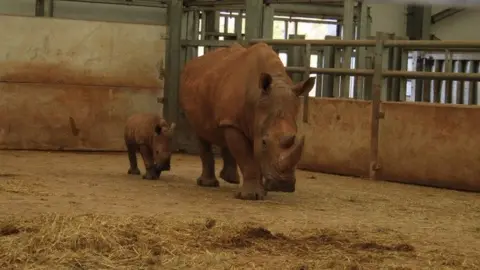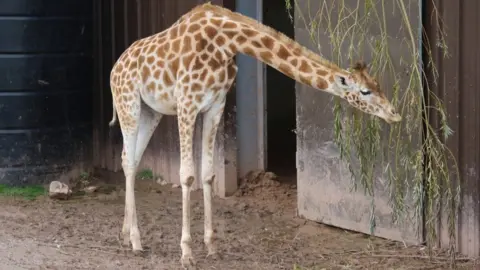Safari Zoo Cumbria inspection carried out after concerns
 Born Free
Born FreeA zoo where an animal rights group raised welfare concerns will again be scrutinised by the local authority.
Born Free campaigns to keep animals in the wild and claimed it had found issues at Safari Zoo Cumbria in 2022.
Concerns about animals' food and water were also raised by the landlord, Zoo Investment Company (ZIC) but inspectors acknowledged it met basic standards.
The zoo said it was aware of issues and Barrow Borough Council's inspection report will be discussed on Thursday.
Born Free previously said its representatives had visited the zoo in Dalton-on-Furness on 17 October after receiving "multiple public reports of concern".
It said the zoo, which was taken over in 2017, "continues to fail to meet" even "basic standards of animal welfare".
 Born Free
Born FreeA council inspection was then carried out in November by Ivor Churcher, commercial team leader at Barrow Council and Dr Matthew Brash, the council's professional veterinary advisor.
That report has since concluded, reports the Local Democracy Reporting Service (LDRS) and is set to be considered by a meeting of the council's licensing regulatory committee.
The report said, following the assessment of the zoo on 17 November, rodents had been found in "multiple areas" at the site and that rhinos spent a "significant proportion" of their time in restricted stables.
However, it did say the animal enclosures had been maintained in a way that "appears to meet the secretary of state's standards of modern zoo practice".
It also said animals requiring medical attention had received "appropriate levels of care in a timely manner".
Despite ZIC's concerns about the "presence of considerable quantities of faeces" in the rhino stables and "the lack of visible food or water", the report said there was no evidence the animals had not been regularly cleaned.
It also said there was no evidence to suggest the animals were not provided with sufficient food and water.
But it found a door to the keepers' kitchen remained open throughout the day, providing "easy access for pests such as birds, rodents and flies".
However, the report noted there was no evidence of rodent faeces within the keepers' kitchen.
There was, however, an unoccupied bird's nest above the food preparation area.
Dr Brash concluded that "a safe and effective programme" for pest and vermin control needed to be established.
In response, the zoo said the rodent situation was "an ongoing and live issue".
"We feel have a proactive approach to pest issues, the inspector has not highlighted anything we are not aware of," a spokesperson told the LDRS.
"We can see problem areas being resolved and numbers of rodents on the decrease, and we can see a real uplift in animal keeper vigilance and involvement as well as other departments."

Follow BBC North East & Cumbria on Twitter, Facebook and Instagram. Send your story ideas to [email protected].
